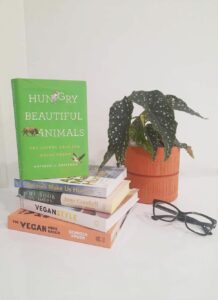
Article

Let’s talk about eggs, baby! Salt-N-Pepa might not have been singing about them in their 90s hit, but it’s still a cracking way to start this conversation (pun very much intended). Because, when it comes to the future of eggs, there’s a lot more beneath the shell than most of us realise…
What came first – the chicken or the egg? Honestly, that age-old question has had more airtime than it deserves. I mean, does it matter? Wouldn’t our time be better spent looking to the future and asking where the egg industry is headed? Let’s take a closer look at the dark side of egg production, plus the best plant-based egg alternatives.
For most of us, eggs have been seen as a staple part of our diets. They’re one of the most common items on Aussie breakfast menus, used in baked goods like they’re going out of fashion (spoiler alert: they are) and constantly praised for their high protein content. But there’s a lot more to eggs than meets the eye:
🩺 This 2021 PLoS Medicine study found that egg consumption increased the likelihood of heart disease-related deaths, due to high cholesterol levels. The findings resulted in recommendations for eggs to be replaced with high-protein plant sources, such as nuts and legumes, for better heart health.
🌏 While egg production may sit at the lower end of the scale when it comes to animal agriculture and environmental footprint, it still generates considerably higher global greenhouse gas emissions than the highest impact plant proteins. Not to mention, it’s substantially more water-intensive.

🥚 Egg production workers are often exploited, with refugee and migrant workers more vulnerable to poor treatment. This makes egg production not only an animal rights issue, but also a human one.
🫁 Due to airborne dust particles and high ammonia levels, workers in egg production are prone to chronic respiratory issues and skin and eye diseases due to exposure to disinfectants, detergents, formaldehyde and pesticides.

🐔Hens across all systems of egg production – whether caged, barn-laid, or free range – are denied basic freedoms and subject to cruel and legalised practices, before being slaughtered at just a fraction of their natural life span.
🐥 Hens are denied the freedom of their natural behaviours, including laying in a nest, dustbathing, and the simple act of spreading their wings.
🐣 Male chicks born into the egg industry are killed on their first day of life, as they cannot produce eggs and are therefore deemed as ‘waste’.
You may be surprised to hear that most cage eggs aren’t sold in cartons, but hidden in everyday food products that even the most conscientious shopper may not notice. For those of us who wish to avoid eggs for health, environmental, human rights, or animal welfare reasons, read on for the lowdown on egg-free eating to keep your tummy full, your taste buds happy, and your dietary impact light.
Breaking up with eggs is easy once you know the many tips, tricks, and products available:

As mentioned, breakfast is often egg-heavy, but it doesn’t have to be. Are you a lifelong scrambler? Try this Ultimate Tofu Scramble – or as I like to call it, your new favourite meal. For those times you need something a little quicker, Orgran Easy Egg is a widely available egg-free product that can help you whip up a breakfast scramble or omelette with ease in only a few minutes!
You can also find plant-based fried and poached eggs at many Asian grocers, health and specialty stores, making egg muffins and big breakfasts a product swap away. If you don’t mind spending a bit more time in the kitchen, you can always make your own Eggs Benny with Hollandaise Sauce, or give these hard-boiled wonders a shot. They’re worth the extra effort!

With breakfast out of the way, let’s look at lunch. Swap out your usual egg and lettuce sandwich for this tasty Tofu-based Egg Salad recipe. And with just a slight alteration, you can be enjoying curried egg sandwiches at your next high tea.
No time for food prep? No problem! Why not pick up a plant-based egg muffin from your local Starbucks? Just be sure to ask for it without cheese to make it vegan-friendly. Egg-free foods are becoming more accessible by the day, so keep an eye out at your fave food spots for all the exciting new releases.

If frittata or quiche are your dinnertime favourites, you’ll be happy to learn that there are egg-free recipes aplenty, like this Artichoke & Olive Quiche, or this Pumpkin, Caramelised Onion & Rosemary Tart, that harness the eggy qualities of tofu.
A special mention must go to black salt, or kala namak, as it’s otherwise known. While this may seem like an ingredient you could trade for a standard salt, trust me – it’s more than worthy of pantry space. This particular salt is high in sulphur, giving an egg-like taste to any dish. You can find it in health food stores and most Indian grocers.
For simple dishes that call for egg as a binder, Orgran No Egg is your go-to. While there are easy subs for binders such as olive oil, banana, applesauce, flaxseeds, and more, having a pack of this product in your pantry is always handy. It’s shelf-stable, inexpensive, and doesn’t affect the taste of your creation.

While some desserts, such as pavlova and meringues, are commonly believed to require vigorous whipping of egg whites, surprise, surprise – aquafaba does the trick!
Aquafaba is a relatively new discovery, so if you’ve not heard the name, don’t despair – you’ll definitely know the ingredient! It’s simply the liquid from a tin of chickpeas, which has similar compounds to egg whites, making it a cheap and reliable sub for eggs.
Aside from catering to egg allergies or having leftover chickpeas to add to a delicious curry or Bolognese, I’ll never not be impressed by eating a tangy lemon meringue pie, knowing its stiff peaks of sweet meringue were made with pulses. I mean – that’s a health food in my book!
So, if you can make and eat everything your heart desires without them, what does this mean for the future of eggs? Well, I can’t say what it means for egg production (though given the carbon footprint, I imagine more people will shift to more sustainable alternatives), but I can give some insight into what it means for egg-free alternatives by looking at the impressive innovations happening globally.
🫙 Australian-based company Meliora has brought to market a plant-based egg in a bottle that can be used to make fluffy scrambles in no time.
🍰 The Every Company has developed egg white substitutes for mass production, targeting food service companies and providing them with a more cost-effective solution to eggs for use in their products.
🍳 Yumgo have also managed to crack the secret to plant-based egg yolks!
While not all of these products are available in Australia just yet, it’s only a matter of time until more egg alternatives find their way to supermarket shelves.

Many people keep hens, or at the very least, have a friend or neighbour who does. While hens may lay eggs with varying regularity, the best thing you can do for them is hard-boil their eggs, allow them to cool, and then crush them – shell and all – into a bowl with appropriate veg or salad. Their egg’s shell contains vital nutrients for their health, and a super-boost of protein.
Just because hens are laying, it doesn’t mean you must eat their eggs!
With so much evidence that egg-free living is better for your health, animals and the environment, the best time to take eggs off your plate is…? You guessed it – right now!
Get started with our top egg-free recipes, discover the best vegan substitutes and egg alternatives to use in your bakes, and master the art of aquafaba to impress your dinner guests. I mean, any of the desserts on this list will likely leave you swimming in your own drool (in a good way), amazed at how easy it is, and wondering why you didn’t do it sooner! ![]()
Want to learn more? You can order your copy of our FREE egg-free guide here!

Jacqui likes to spend her spare time with her two cats, eating sweet treats and listening to 90s British pop. She enjoys making plant-based goodies inspired by her love of all things David Lynch, and if she’s cooking dinner, you better believe there is gonna be spice!